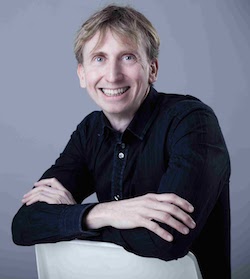
Described as “an outstanding virtuoso—one of the finest players of his generation” by Moscow’s Kommersant Daily; as a performer “full of energy and wit” by the New York Times; and by the Singapore Straits Times as “a formidable virtuoso,” Scottish pianist and scholar Kenneth Hamilton concertizes worldwide as a soloist on both modern and historical instruments. His publications have also had an international impact, with his much discussed most recent book, After the Golden Age: Romantic Pianism and Modern Performance (Oxford University Press), welcomed as “full of wit and interest, and written with passion” by Charles Rosen (Times Literary Supplement) and as “a wonderful book” by James Fenton (The Guardian).
An enthusiastic advocate of the value of musical scholarship both for performers and their audiences, Hamilton is a committed public communicator who believes that the appreciation of music in its historical context can vitally enhance its meaning. And the more we understand, the more we can be moved. He himself has never entirely lost his fascination for the multifarious history of piano performance, nor for the works of Wagner, Chopin and Liszt, among others.
He has broadcast frequently as pianist, presenter or panellist on television and radio, most recently as soloist in a performance of Chopin’s first piano concerto with the Istanbul Chamber Orchestra for Turkish Television, as presenter of “Mendelssohn in Scotland” for Deutsche Welle Channel (where he was overshadowed in every sense by the Scottish scenery) and as interviewee for CBC (Canada), ABC (Australia) and New York Public Radio. He is also a familiar voice on BBC Radios 3 and 4, and the World Service.
As a pianist, he has numerous international engagements to his credit, including a memorable recreation of Liszt’s 1847 concerts in Constantinople for the Istanbul International Festival, performances of works by Chopin on historical and modern pianos at the Cité de la Musique, Paris, participation as a soloist in the Beethoven, Mozart and Brahms Unwrapped Festivals at London’s Kings Place, appearances at the Southbank, at festivals in Korea, in numerous venues in the US, and annual recitals at the Singapore Esplanade.
As a writer, Hamilton has published widely in the academic and popular press, the latter including a bicentenary article on Liszt for the New York Times. His monograph After the Golden Age: Romantic Pianism and Modern Performance (Oxford University Press, 2008) became a Classical music bestseller soon after its publication, and attracted a remarkable amount of attention worldwide, including reviews by Alex Ross in the New Yorker, James Penrose in the Wall Street Journal, and articles in the Frankfurter Allgemeine Zeitung, and the China Times. In the year of its publication, After the Golden Age was a CHOICE Outstanding Academic Title in the US, and a Daily Telegraph Book of the Year in the UK. In 2009 it was the recipient of an ARSC Certificate of Merit for Research into Recorded Music.
Hamilton is also the author of Liszt: Sonata in B-minor (Cambridge University Press) and contributing editor of The Cambridge Companion to Liszt. Works in progress include The Piano, a general history of the instrument and its performance-practice for Yale University Press; The Piano in Prose: Source Readings in the History of the Piano (co-authored with Monika Hennemann) for Oxford University Press; and a monograph on the music of Liszt, also for Oxford University Press.
Hamilton has given keynote addresses at numerous international conferences, and spoken frequently at the annual meetings of the American Musicological Society (AMS) of which he is an elected member of the Performance Committee. He has been Guest Professor at the University of Connecticut, and presented many lectures and masterclasses at the invitation of universities and conservatories worldwide, including the New England Conservatory, Berkeley, Stanford, and Brown Universities in the US; the University of Leuven, Belgium; the University of Minho, Portugal; Musikeon, Valencia, Spain; Yonsei University, Seoul, Korea, the Schola Cantorum, Basel; and the St Petersburg Conservatory in Russia.
He is a graduate of the University of Glasgow and of Balliol College, Oxford—and deeply indebted to both Hugh Macdonald and John Warrack for their inspiring tuition in these respective institutions. His doctoral dissertation at Balliol was a critical study of the opera fantasias and transcriptions of Franz Liszt. At the then Royal Scottish Academy of Music and Drama (now sensibly sporting a much shorter title) his indefatigable piano teachers were Alexa Maxwell and Lawrence Glover. He later benefitted from the pianistic mentoring of Ronald Stevenson, much of whose music he has had the pleasure of performing.
